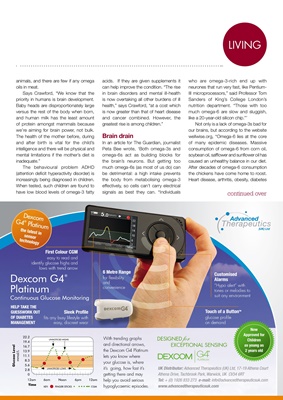
LIVING
animals, and there are few if any omega
oils in meat.
Says Crawford, "We know that the
priority in humans is brain development.
Baby heads are disproportionately large
versus the rest of the body when born,
and human milk has the least amount
of protein amongst mammals because
we're aiming for brain power, not bulk.
The health of the mother before, during
and after birth is vital for the child's
intelligence and there will be physical and
mental limitations if the mother's diet is
inadequate."
The behavioural problem ADHD
(attention deficit hyperactivity disorder) is
increasingly being diagnosed in children.
When tested, such children are found to
have low blood levels of omega-3 fatty
acids. If they are given supplements it
can help improve the condition. "The rise
in brain disorders and mental ill-health
is now overtaking all other burdens of ill
health," says Crawford, "at a cost which
is now greater than that of heart disease
and cancer combined. However, the
greatest rise is among children."
Brain drain
In an article for The Guardian, journalist
Peta Bee wrote, 'Both omega-3s and
omega-6s act as building blocks for
the brain's neurons. But getting too
much omega-6s (as most of us do) can
be detrimental: a high intake prevents
the body from metabolising omega-3
effectively, so cells can't carry electrical
signals as best they can. "Individuals
who are omega-3-rich end up with
neurones that run very fast, like PentiumIII
microprocessors," said Professor Tom
Sanders of King's College London's
nutrition department. "Those with too
much omega-6 are slow and sluggish,
like a 20-year-old silicon chip."'
Not only is a lack of omega-3s bad for
our brains, but according to the website
wellwise.org, "Omega-6 lies at the core
of many epidemic diseases. Massive
consumption of omega-6 from corn oil,
soybean oil, safflower and sunflower oil has
caused an unhealthy balance in our diet.
After decades of omega-6 consumption
the chickens have come home to roost.
Heart disease, arthritis, obesity, diabetes
continued over